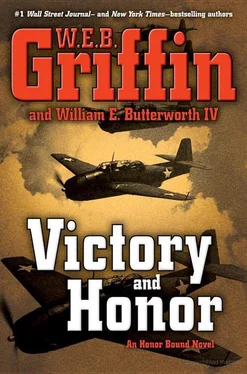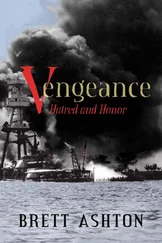They shorted me almost four thousand dollars!
Oh, well. Better the bulk of it than nothing at all.
Flowers then extended his fountain pen.
“Please sign that,” he said.
Frade did so, handed pen and paper back, then, nodding at the briefcase, asked, “It all fit in there? Half a million dollars?”
“You may count it if you wish, but I assure you it’s all there.”
Frade nodded, opened the briefcase, and looked into it. It held five bricks of bills, each about the size of a shoe box, wrapped in some sort of oiled paper, which was translucent enough so that he could see stacks of one-hundred-dollar bills.
“Where’d you get it?” Frade said. “The Bank of Boston?”
“It came by diplomatic pouch,” Flowers said.
Frade said nothing.
“You of course may keep the briefcase,” Flowers went on, “until it’s convenient for you to drop it off at the embassy.”
“Thank you,” Frade said, then had an irreverent thought and said it aloud: “It would be really bad form for me to walk out of here carrying all that money in my arms like so much Kleenex.”
“I think I have the right to an explanation, Colonel Frade,” Flowers said. “That’s a great deal of money. What are you going to do with it?”
“Sorry, Colonel, you just don’t have the need to know.”
Did I say that because I didn’t want to get into a long explanation of where and how I’ve been spending the OSS’s money?
Or because I really dislike him?
“Sooner or later, Colonel Frade, you’re simply going to have to accept that as the senior OSS officer down here, I do have the need to know about whatever you’re doing.”
Frade shrugged and in an agreeable tone said, “I hope you understand that I’m just obeying my orders, Colonel. It’s nothing personal.”
Flowers met Frade’s eyes, and Frade thought he could actually see steam coming out of Flowers’s ears.
Then Flowers cleared his throat and changed subjects.
“There is something else I would like to discuss with you, Colonel Frade.”
“Yes, sir?”
“As you know, I wear several hats. I am both the military attaché here as well as the senior OSS officer in Argentina. While that latter role is, of course, known to the assistant chief of staff for intelligence, it is not known by any of the other military attachés in South America. They don’t have, as you like to say, the need to know.”
Why do I think he’s rehearsed this speech?
No. What Colonel Pompous has done is to write it down and then nearly memorize it.
Which makes it important to him.
So where the hell is he going with it?
“Periodically, once every three months or so, the assistant chief of staff, intelligence—ACofS G-2—convenes a conference of military attachés in South America. My absence from such conferences would raise questions, obviously, so I attend.
“I have just returned from such a conference, this time held in Rio de Janeiro. The ACofS G-2 personally presided. The subject was our role now that Germany has surrendered. And, as part of this, the role of the OSS for the rest of the war and afterward was discussed.”
Aha! Question answered.
This might be interesting.
Frade said: “And what did you and the ACofS G-2 conclude?”
Flowers’s face showed that he hadn’t expected questions during his speech. He almost visibly thought about answering the question and then decided to go with the rehearsed speech.
“It is the opinion of the ACofS G-2 that (a) General Marshall will order the dissolution of the OSS in the time frame between today and the successful termination of the war against the Empire of Japan and (b) that it would be in the national interest for the OSS simply to be folded, so to speak, into Army Intelligence.”
“How long do you think it will be before we can successfully terminate the war against the Empire of Japan?” Frade asked.
There was an element of sarcasm in Frade’s parroting of the “successful termination” phrase. It went right past Flowers.
“A number of factors affect that, actually,” Flowers said. “For example, the main Japanese islands are under daily bombardment by B-29 aircraft.”
“Germany also was under daily aerial bombardment,” Clete replied. “We still had to cross the Rhine and take Berlin before they surrendered.”
“There are other factors,” Flowers said almost condescendingly.
Does that mean he knows about the atomic bomb?
The ACofS G-2 certainly does—Army Intelligence must have counterintelligence agents swarming all over the Manhattan Project—but I can’t believe ACofS G-2 would tell Flowers anything about it.
If there’s anyone who doesn’t have a need to know his name is Flowers.
Let’s find out.
Frade said: “You’re talking about the Los Angeles Project? Right?”
Flowers’s face showed that the Los Angeles Project—which Frade, of course, had just invented—was news to him.
“Or maybe the Manhattan Project?” Frade pursued.
“One or the other,” Flowers said. “Probably both.”
Colonel, you’ve never heard of the Manhattan Project until just now, Clete thought, and was still—with difficulty—resisting the temptation to ask Colonel Flowers whether he thought the New Orleans Project—or maybe the Sioux Falls Project—was also going to affect the successful termination of the war against the Empire of Japan.
But then Flowers asked: “So, do you agree?”
What?
“With what?”
Flowers went on: “That it would be in the national interest for the OSS to be simply folded into Army Intelligence.”
“After the successful termination of the war against the Empire of Japan, you mean?”
The sarcasm again sailed right over Flowers’s head.
“Then or now,” Flowers replied. “Would you agree that the OSS should be folded into Army Intelligence? Surely, you’ve thought about that.”
“Not until just now. You’re sure, Colonel, that the OSS is about to be—what?—dissolved?”
“Well, Frade. I got that, I told you, directly from the ACofS G-2. And he would certainly know, wouldn’t you agree?”
“Did the ACofS G-2 say why they’re going to abolish the OSS?”
It took Flowers a moment to come up with a reply, but finally he said, “Because it will not be needed.”
“Then why fold it into Army Intelligence?” Frade asked innocently.
Flowers started to reply—his mouth was actually open—and then he had an epiphany and it caused him to lose his temper.
“You arrogant sonofabitch!” Flowers blurted, spittle flying from his lips. “If you think you can make a fool of me, you’ve got another think coming!”
“Did I say something that offended you, Colonel?”
“You knew all about this, didn’t you? And don’t lie to me, Frade. Colonel Donovan told you, didn’t he?”
“Told me what?”
“That the OSS is to be dissolved.”
Frade held up his right hand, pinkie and thumb touching, three fingers extended.
“Boy Scout’s Honor, I have never discussed this with Wild Bill.”
Flowers glared at him, his face flushed with anger.
Frade went on: “And with respect, sir. It’s not Colonel Donovan. It’s General Donovan. Wild Bill’s a major general now. I’m surprised you didn’t know that.”
Flowers was red-faced, and Frade could see steam coming out of his ears again.
“You ever hear, Frade, that he who laughs last laughs best? I’m going to have your ass sooner or later. Count on it!”
“Yes, sir. I’ll tell General Donovan you said that, when I tell him you told me the ACofS G-2 told you that the OSS is going to be dissolved and that you and he are agreed that it should be folded into Army Intelligence.” Frade paused, then gave in to temptation: “With the help of the Los Angeles Project, and maybe even the New Orleans Project.”
Читать дальше












